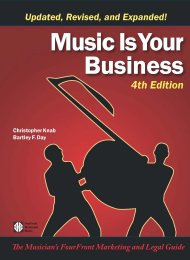I was
listening to the latest release of a client of mine today. I won't mention
their name due to some of the comments I have to make about it. I don't want to
offend them, overall they made a good new release. But there is a big
difference between a good record, and a GREAT record.
I would like to share some of my thoughts while listening to their release
because as I was listening I was reminded about the music industry I grew up
with, and especially some of the good things about an industry that in the 60's
thru the 90's was a whole different animal.
You have all heard some stories about all the rip-offs of young, (and old)
artists and bands, and how horrible some of the recording contracts were back
then. But before I launch into things I want to stress that no matter how many
ripoffs there were, or how the business of music was conducted before the dawn
of the digital age, there were also some good aspects of being signed to major
label, and even the earlier independent labels of era's long gone..
1) When a record label signed an act and gave them an advance to record that
record, standing right beside those artists were legions of seasoned music
business professionals. From the A&R reps that discovered a new act, to the
label brass that approved the signings, to the producers and engineers who
recorded them, to the amazing promotional people behind getting them radio
airplay or working the distributors and store buyers, and even the talented
publicity folks who knew how to make the press excited about an new act. Many
of these old school guys had a inherent talent, and that was the ability to
smell a hit record, and how to make it a hit.
2) We wouldn't have the rich legacy of amazing music that we do have without
this army of talented label reps doing what they do best...work a record in
such a way that got that act's songs to become the hits, and played over and
over for many months or even years. The men and women who created the hits of the past had a skill. We used to
compliment these people by saying "So and so has really got ears!" In many ways
it was THE compliment to get back then. If you had that ability you stayed
employed a long time.
3) So what happened? Why aren't the thousands of new releases I have talked
about so much, (over 80,000 new releases in '08 for example) producing as many
lasting songs as they used to 20, 30, or even 40 years ago? One main reason is
technology. By this I mean in the past, not every musician had the luxury of
going into a studio, let alone having their own home studio, or computer
software available to record themselves. What I am leading up to is that maybe
it isn't all that great that technology has evolved so rapidly that everybody
and their sister can and does record themselves, because therein lies a strange
phenomenon: Without an experienced music professional, who has the ability to
hear in a recording what is right AND what is wrong with a song? Where are we
now? We're on our own, and for the most part we don't always know what we're
doing.
4) So, back to my first thoughts while I was listening to the new release by
this client of mine. This band, overall, is amazing. The lead singer is a woman with a voice to die
for, and they do have experienced musicians in their band who are quite good to
say the least. But, and it is a big BUT... what they lack is the 'business
sense' of those old guys who could hear in a mix or a demo, or even a finished
product, what was right about it and what was wrong with it.
So, I am listening to their new CD and I am blown away by the first track and
the second, and even the third tune, and then the momentum stopped. and the
next couple of songs are ok, but I found myself losing interest quickly, and
around track 7 or 8, I forget which, the amazing lead vocalist doesn't sing,
maybe she does a bit of background vocals but that's it. And what do I hear,
ruining the whole pacing of the CD... another voice, a male voice, who can't
sing for shit dropping in to fuck up the whole record. At this point I stopped
enjoying the CD for the most part, and now it is ruined for me. If I listen
again I will have to delete that song if I have any chance of liking it again.
What happened? I'll tell you what happened...there was no label guy butting in,
and stopping the session and saying loud and clear "What is this??!! Why
are we recording this limp dick singer with a lousy voice and letting him ruin
a very good recording??"
That is what is different today from the so-called good ol' days. Artists are
artists, and they are mere mortals with faults like any of us. Except since
they can record themselves, even bring in a fairly good producer maybe, that
someone or someones in the group is afraid to speak up when the limp dick
member of the band comes in with "his" song.
5) That's it. That is what I needed to write about today. Remember my
bumper-sticker comment " Just because you can record, doesn't mean you
should" In this case I say...bring back the good ol' days!! With all its
faults the record industry of old had more say and control of the artist in the
studio then they do today, and why is that? Because in those suppodedly good
ol' days, the record label was paying for the record. They had an investment
in the record, and they wanted the record to be a hit. Because financial
rewards are an important reward and an significant measure of success and
satisfaction for everyone associated with the record.
Everyone today who is recording their own music can learn a lot about what to
do with that recording, during the studio process, and all the way down the
marketing phase of the project.
Do you have the "ears" to hear what is right or wrong for your
recording? That's the question isn't it. Watch your egos folks. or pick someone
you trust to watch it for you. It will be worth it in the long run.
|
|
|||||||||||



